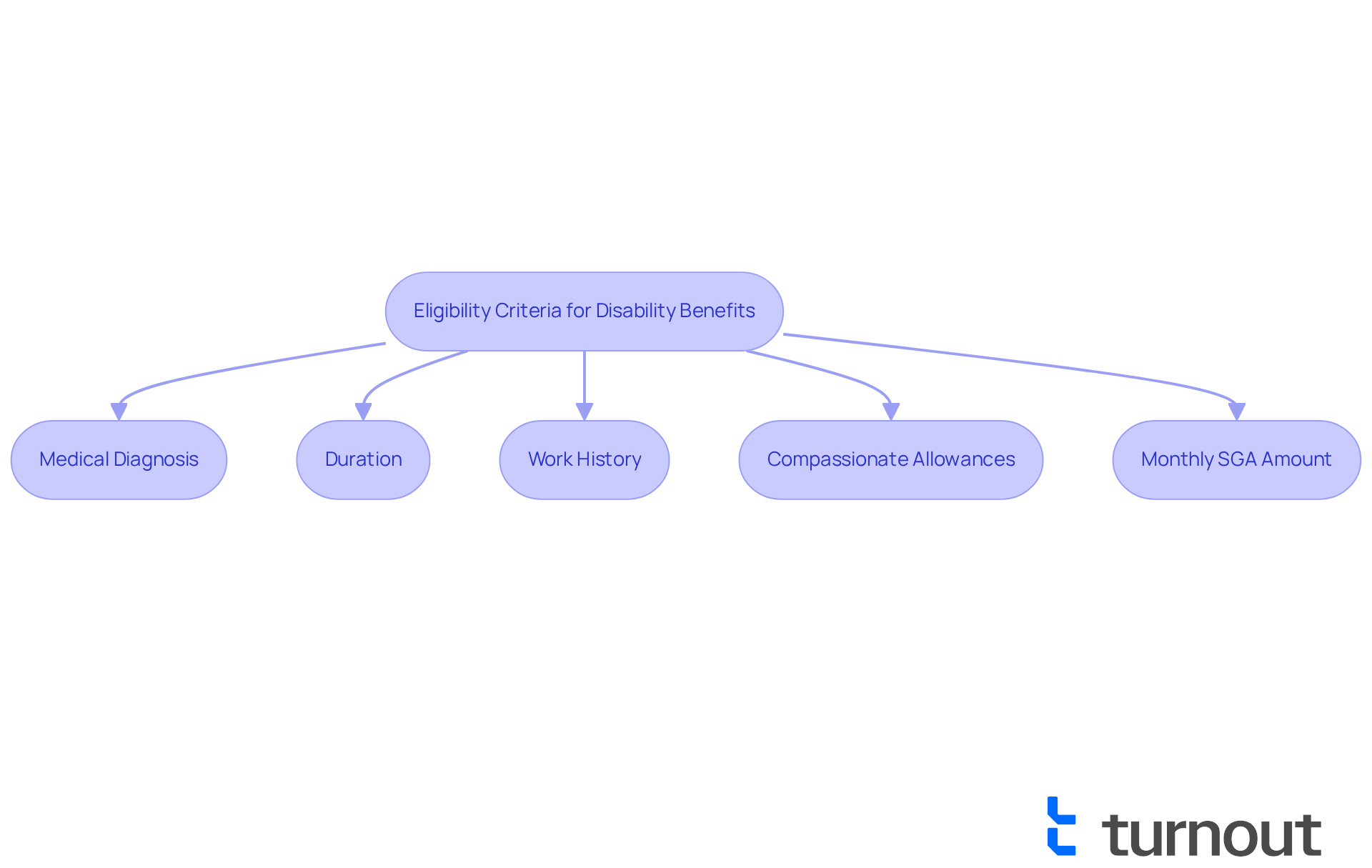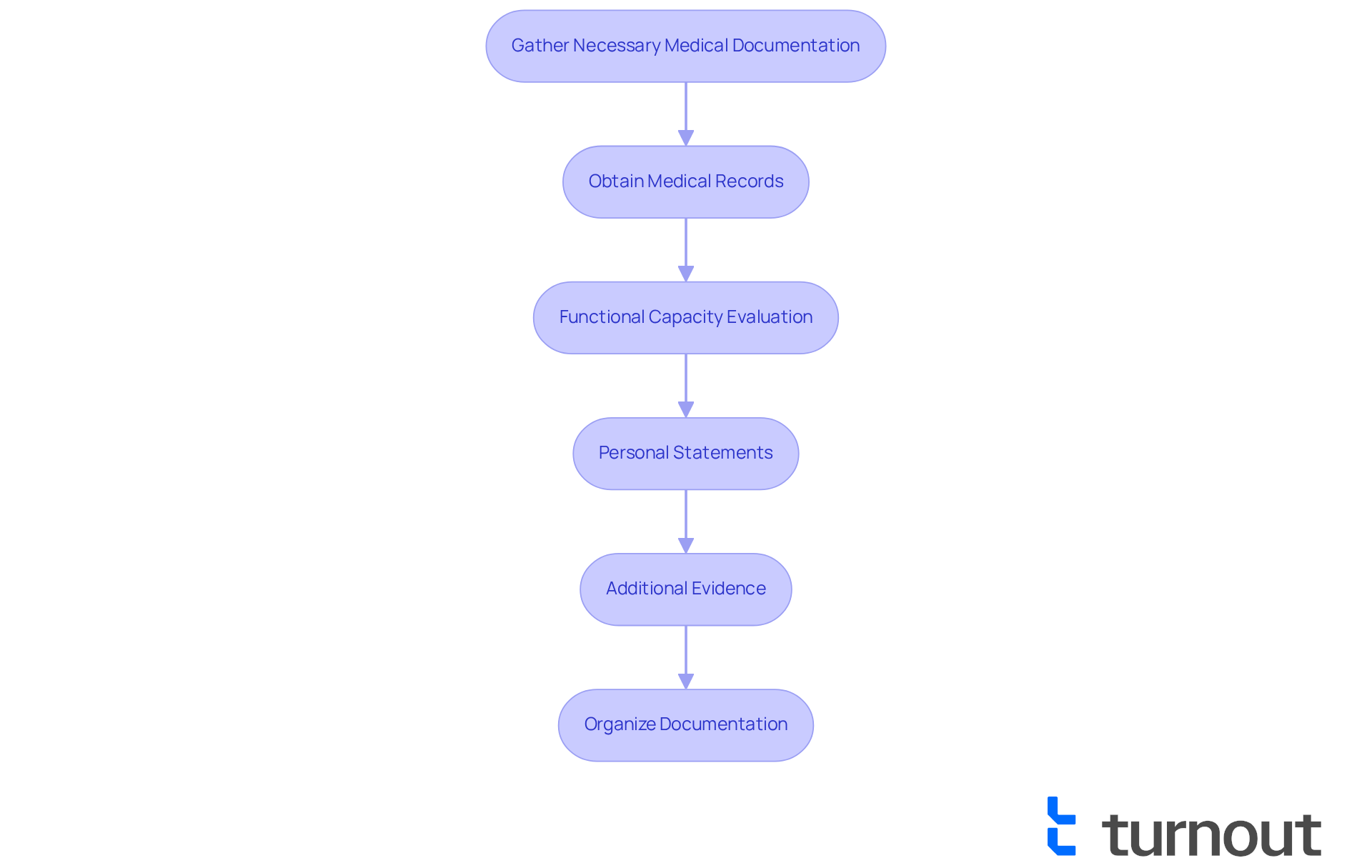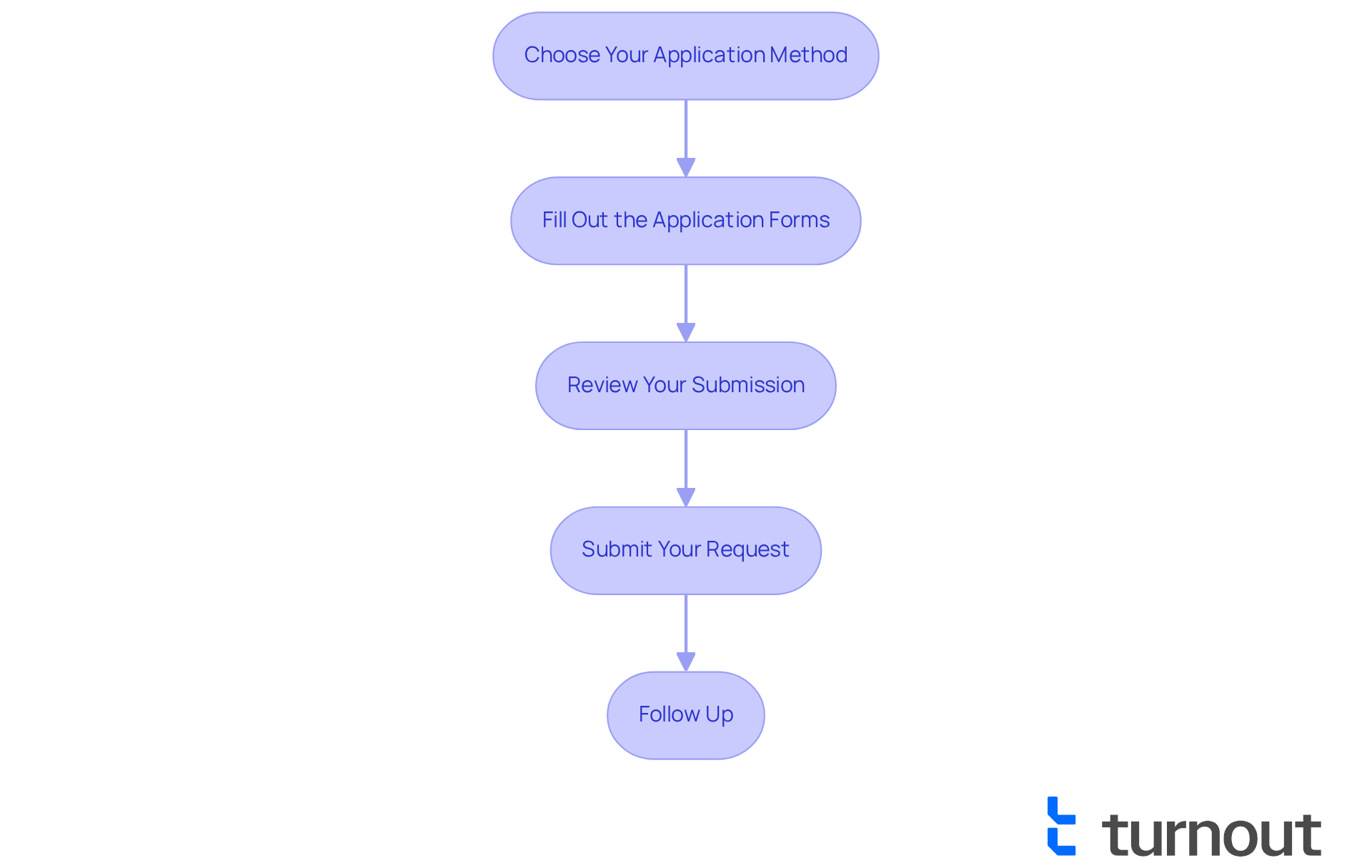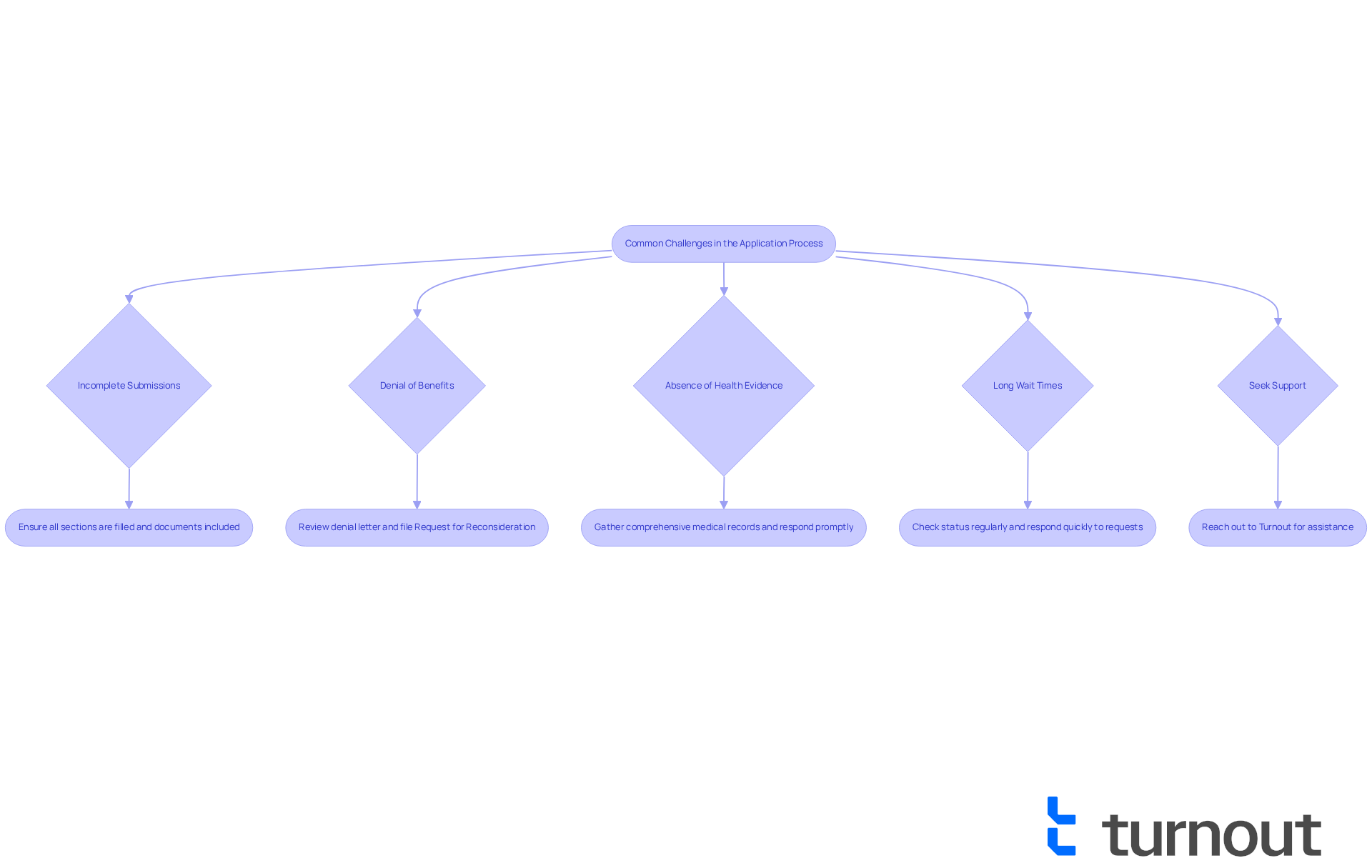Overview
Navigating the process of obtaining disability benefits for heart problems can feel overwhelming. We understand that the strict eligibility criteria set by the Social Security Administration (SSA) can add to your stress. It’s essential to have thorough medical documentation that clearly outlines your condition and the significant work limitations you may face.
To help you through this journey, we want to emphasize the importance of keeping detailed health records. This documentation is crucial for your application. Additionally, consider the potential benefits of the Compassionate Allowances program. This program can expedite the approval process for severe cases, providing much-needed relief.
Remember, you are not alone in this process. We’re here to help you every step of the way. By gathering your health records and understanding your options, you can take proactive steps toward securing the benefits you deserve.
Introduction
Navigating the complexities of securing disability benefits for heart problems can feel overwhelming. We understand that the stringent criteria set by the Social Security Administration (SSA) can add to your stress. Many individuals grappling with cardiovascular issues find themselves facing a maze of eligibility requirements and documentation hurdles. This article is here to help demystify the process, offering essential insights and practical steps to enhance your chances of a successful claim. Yet, amidst these guidelines, a pressing question remains:
- How can you effectively overcome the challenges inherent in proving your condition's impact on your ability to work?
You're not alone in this journey, and together, we can explore the path forward.
Understand Eligibility Criteria for Disability Benefits
If you're facing cardiovascular issues and seeking disability benefits, it's crucial to consider how hard it is to get disability for heart problems, as the Social Security Administration (SSA) has specific requirements you must meet. We understand that this can be a challenging journey, especially considering how hard it is to get disability for heart problems, and we're here to help you navigate it. Here are the key factors to consider:
- Medical Diagnosis: Your cardiac condition needs to be assessed and documented by a healthcare professional. Commonly recognized ailments, including chronic heart failure, ischemic heart disease, and arrhythmias, often lead to inquiries about how hard is it to get disability for heart problems.
- Duration: Your condition should be expected to last at least 12 months or result in death. Unfortunately, temporary issues do not qualify.
- To evaluate how hard it is to get disability for heart problems, you must demonstrate that your heart condition significantly limits your ability to perform basic work activities, such as lifting, standing, walking, and concentrating.
- Work History: It's necessary to have enough work credits, which usually means having worked a certain number of years in jobs covered by Social Security.
The SSA's Compassionate Allowances program has been a beacon of hope, as it helps to clarify how hard is it to get disability for heart problems by expediting the approval process for individuals with severe heart-related disabilities. With over 1.1 million individuals approved through this initiative, it underscores how hard it is to get disability for heart problems and the importance of thorough health documentation in securing benefits. Recently, the Compassionate Allowances list expanded to include 13 new conditions, providing further support for applicants with serious diagnoses.
As we look ahead to 2025, it's crucial to be aware that the monthly Substantial Gainful Activity (SGA) amount is set at $1,620 for non-blind individuals and $2,700 for statutorily blind individuals. Monitoring this amount is essential, as it directly impacts your eligibility. Understanding how hard it is to get disability for heart problems is vital, especially with the recent changes to eligibility standards for 2025. These changes highlight the need for strong health-related evidence, adherence to treatment recommendations, and open communication with your healthcare providers.
For more detailed information, we encourage you to refer to the SSA's Blue Book, which outlines specific cardiovascular impairments that may qualify for benefits. Remember, you are not alone in this journey, and there are resources available to assist you.

Gather Necessary Medical Documentation and Evidence
To enhance your application for disability benefits, it’s essential to consider how hard it is to get disability for heart problems and collect thorough health documentation. We understand that this process can feel overwhelming, so we’ve outlined some helpful steps for you:
-
Obtain Medical Records: Start by requesting copies of your medical records from all healthcare providers who have treated your cardiovascular issue. This includes:
- Test results (e.g., EKGs, echocardiograms, stress tests)
- Treatment history (medications, surgeries, hospitalizations)
- Doctor's notes detailing your symptoms and limitations.
-
Functional Capacity Evaluation: If possible, obtain a functional capacity evaluation from your healthcare provider. This evaluation explains how your cardiovascular issue influences your ability to carry out job-related duties, which is essential for showcasing your restrictions.
-
Personal Statements: Consider writing a personal statement that explains how your heart issue affects your everyday life and capacity to work. This narrative can provide further context to your health records and illustrate the real-life impacts of your situation.
-
Additional Evidence: Gather any other relevant documents, such as work history, educational records, and financial information, to support your claim. This holistic approach can strengthen your application.
Ensure that all documentation is organized and clearly labeled to facilitate the review process. Remember, the quality and comprehensiveness of your health evidence can significantly influence the outcome of your SSDI claim. The Social Security Administration requires detailed documentation to verify the severity of your condition and its impact on your ability to work.
Statistics indicate that more than 60% of disability cases in the workforce are attributed to heart disease, which leads to the question of how hard is it to get disability for heart problems, highlighting the importance of comprehensive health documentation. Additionally, case studies show that claimants who gather thorough evidence from various healthcare providers and document their symptoms effectively can present a stronger case for SSDI approval, illustrating how hard it is to get disability for heart problems. As noted by healthcare professionals, "Detailed, comprehensive medical documentation is crucial for a strong SSDI case." Furthermore, it's important to recognize that the average age of individuals receiving disability benefits is 53, underscoring the demographic most affected by these conditions.
You are not alone in this journey. We’re here to help you navigate through these steps with compassion and understanding.

Complete and Submit Your Disability Application
Once you have gathered all the necessary documentation, you can confidently move forward to finalize and submit your disability request. Here’s how we can help you through this process:
- Choose Your Application Method: You have options! You can apply online through the SSA website, by phone, or in person at your local Social Security office. Many find that online applications are faster and more convenient, often leading to shorter processing times than in-person submissions.
- Fill Out the Application Forms: Complete the Adult Disability Report (Form SSA-3368) and the Application for Disability Insurance Benefits (Form SSA-16). Take your time to be thorough and accurate by listing all impairments, as it can affect how hard it is to get disability for heart problems. Advocates emphasize that comprehensive health documentation significantly boosts your chances of approval, especially when considering how hard it is to get disability for heart problems.
- Review Your Submission: Before you submit, take a moment to examine your documents for completeness and accuracy. Ensure that all medical documentation is included and that you have answered every question fully. A well-prepared submission can lead to quicker processing times.
- Submit Your Request: When you're ready, submit your request along with all supporting documents. If you’re applying online, simply follow the prompts to upload your documents. If you choose to apply by mail, send copies of your documents and remember to keep a record of what you sent.
- Follow Up: After submission, you can check the status of your request online or by contacting the SSA. Keep records of any correspondence and be ready to provide additional information if needed. Remember, applicants with comprehensive medical records are more likely to see favorable outcomes.
Additionally, consider utilizing the Disability Starter Kit. It offers essential information on required documents and the decision-making process for disability benefits. For assistance, you can call the toll-free number 1-800-772-1213 or the TTY number 1-800-325-0778 for those who are deaf or hard of hearing. You are not alone in this journey; Turnout provides support through trained nonlawyer advocates who can guide you through the SSD claims process, ensuring you have the necessary resources to navigate these complex systems effectively.

Troubleshoot Common Challenges in the Application Process
Navigating the disability request process can indeed feel overwhelming. We understand that you may encounter various challenges along the way. Here are some common issues and compassionate ways to address them:
- Incomplete Submissions: It's common for requests to be rejected due to missing details. To avoid unnecessary delays, ensure that every section is filled out and that all required documents are included.
- Denial of Benefits: If your application is denied, please don’t be discouraged. Take a moment to carefully review the denial letter; understanding the reasons for the decision is crucial. You have the option to appeal by filing a Request for Reconsideration within 60 days. Many applicants find success at this stage, so stay hopeful.
- Absence of Health Evidence: Should the Social Security Administration (SSA) request further health documentation, it’s important to respond promptly. Gather the necessary documentation, including comprehensive medical records spanning at least 12 months, and submit it as soon as possible to prevent further delays.
- Long Wait Times: We recognize that the process for obtaining a decision can take several months, averaging 232 days for an initial verdict. Staying proactive by regularly checking your status and responding quickly to any SSA requests can help ease the waiting period.
- Seek Support: If you encounter difficulties, consider reaching out to Turnout. They provide access to trained nonlawyer advocates who can assist you with SSD claims. It’s essential to know that Turnout is not a law firm and does not provide legal advice. These advocates are here to help you navigate the complexities of your case without the need for legal representation. Additionally, support groups can offer valuable guidance and assistance throughout your journey.
By preparing for these challenges and utilizing resources like Turnout, you can navigate the application process more effectively. Remember, you are not alone in this journey, and together, we can improve your chances of receiving the benefits you deserve.

Conclusion
Navigating the pathway to securing disability benefits for heart problems can feel overwhelming. We understand that the eligibility criteria and necessary steps may seem complicated, but knowing them is essential for your success. This journey requires careful attention to your medical documentation, awareness of the Social Security Administration's (SSA) requirements, and a proactive approach to overcoming potential challenges. By equipping yourself with knowledge and resources, you can significantly improve your chances of obtaining the benefits you need.
Key factors such as:
- Having a documented medical diagnosis
- Demonstrating how your condition impacts daily activities
- Ensuring you have sufficient work history
are crucial in the application process. Additionally, the Compassionate Allowances program offers a streamlined route for those with severe heart conditions, highlighting the importance of comprehensive health documentation. As the landscape of disability eligibility evolves, particularly with changes set for 2025, staying informed and organized is paramount.
Ultimately, pursuing disability benefits for heart issues is not just about meeting criteria; it’s also about advocating for yourself. Engaging with support resources, maintaining open communication with your healthcare providers, and diligently preparing your documentation can make a significant difference. The journey may be challenging, but with the right tools and support, you can navigate this process with confidence. Remember, you are not alone in this journey, and we are here to help you every step of the way.
Frequently Asked Questions
What are the eligibility criteria for disability benefits related to heart problems?
To qualify for disability benefits for heart problems, you must have a medical diagnosis from a healthcare professional, your condition must last at least 12 months or result in death, and it must significantly limit your ability to perform basic work activities.
What types of heart conditions are commonly recognized for disability benefits?
Commonly recognized conditions include chronic heart failure, ischemic heart disease, and arrhythmias.
How does work history affect eligibility for disability benefits?
You must have enough work credits, which typically means having worked a certain number of years in jobs covered by Social Security.
What is the Compassionate Allowances program?
The Compassionate Allowances program expedites the approval process for individuals with severe heart-related disabilities, helping to clarify how hard it is to get disability for heart problems.
How many individuals have been approved through the Compassionate Allowances program?
Over 1.1 million individuals have been approved through this initiative.
What is the Substantial Gainful Activity (SGA) amount for 2025?
The SGA amount for 2025 is set at $1,620 for non-blind individuals and $2,700 for statutorily blind individuals.
Why is it important to monitor the SGA amount?
Monitoring the SGA amount is essential as it directly impacts your eligibility for disability benefits.
Where can I find more detailed information about cardiovascular impairments that may qualify for benefits?
For detailed information, you can refer to the SSA's Blue Book, which outlines specific cardiovascular impairments that may qualify for benefits.




